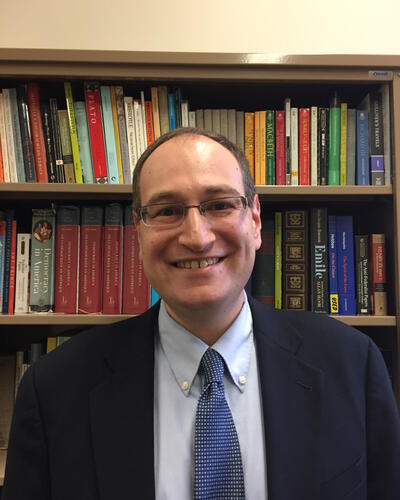Aaron Herold is an Associate Professor in the Department of Political Science and International Relations, coordinator of Legal Studies, and co-director of the Forum on Constitutionalism and Democracy. He teaches courses on political theory, constitutional law, and judicial politics. His research focuses on the American constitutional tradition, the political philosophy of the liberal Enlightenment, and the thought of Alexis de Tocqueville—especially as these pertain to questions about the public role of religion and the separation of church and state. His first book, The Democratic Soul: Spinoza, Tocqueville, and Enlightenment Theology, was published by University of Pennsylvania Press in 2021. His work has also appeared in The American Political Science Review, Political Research Quarterly, The Review of Politics, Perspectives on Political Science, and several edited volumes. Prior to coming to SUNY Geneseo, he taught at Boston College, Rhodes College, the University of Richmond, and the College of the Holy Cross. He has a B.A. from Emory University, an M.A. from the University of Toronto, and a Ph.D. from the University of Texas at Austin.
Professor Herold is spending the 2023-24 academic year as a Visiting Fellow in the Department of Politics and the James Madison Program in American Ideals and Institutions at Princeton University. While on sabbatical at Princeton, he is working on his second book, which examines the current ascendancy of revolutionary thinking: the idea that social and political institutions should be evaluated, reformed, and perhaps even remade from whole cloth, without regard for existing customs and institutions. This book is tentatively entitled Revolutionary Thinking: Populism, Imperialism, and the Trajectory of Modern Democracy.

Curriculum Vitae
Publications
“Statesmanship in Modern Times.” Perspectives on Political Science 50:4 (2022).
The Democratic Soul: Spinoza, Tocqueville, and Enlightenment Theology (University of Pennsylvania Press, 2021).
“A Liberation From Fear: Benedict de Spinoza on Religion, Philosophy, and Mortality.” In Political Philosophies of Aging, Dying, and Death, ed. Erin Dolgoy, Bruce Peabody, and Kimberly Hurd Hale (Routledge, 2021).
"Tocqueville on Religion and Democratic Character: Equality, Mediocrity, and Greatness." In Civil Religion in Modern Political Philosophy, ed. Steven Frankel and Martin D. Yaffe (Pennsylvania State University Press, 2020).
“Tocqueville on Religion, the Enlightenment, and the Democratic Soul,” American Political Science Review 109:3 (August 2015).
“Spinoza’s Liberal Republicanism and the Challenge of Revealed Religion,” Political Research Quarterly 67:2 (June 2014), 239-252.
“‘The Chief Characteristical Mark of the True Church’: John Locke’s Theology of Toleration and His Case for Civil Religion,” The Review of Politics 76:2 (Spring 2014), 195-221.
Classes
-
PLSC 130: Political Theory
This course is an introduction to political theory. Our focus will be on the enduring questions about the character of justice and morality, about the ends or purposes of political life, and about the character of a good society, which have been debated by some of the greatest minds of the past and which continue to reverberate today. Some of the problems we will consider include the character of justice, the nature of rights and obligations, the relationship between individual and community, the strengths and weaknesses of different forms of government, and the political importance of science and religion.
-
PLSC 418: Constitutional Law
A study of the character and implications of American constitutional principles as developed by the United States Supreme Court, with emphasis on the development of judicial review and its impact on our political system, principles of the separation of powers, the problems of federalism, and the powers of Congress and the President.
-
PLSC 432: Liberal Democracy&Its Critics
This course examines the theoretical foundations of modern and democratic politics as well as the thought of some of its leading critics. We will study authors such as Hobbes, Spinoza, Locke, Montesquieu, Rousseau, Kant, Mill, Tocqueville, Marx, and Nietzsche. We will consider the differing views of these authors on topics such as the character of equality, the origin of rights, the strengths and weaknesses of democracy, the virtues and vices of capitalism, the relationship of science to society, the possibility of enlightenment, and the place of religion in politics.